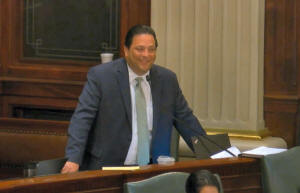Limited in-state college betting bill passes House
 Send a link to a friend
Send a link to a friend
[June 01, 2021]
By JERRY NOWICKI
Capitol News Illinois
jnowicki@capitolnewsillinois.com
 SPRINGFIELD – An omnibus gambling bill that
would allow Illinois bettors to wager on in-state college sports teams
on a two-year trial basis passed the House early Tuesday morning, hours
after its introduction the day prior. SPRINGFIELD – An omnibus gambling bill that
would allow Illinois bettors to wager on in-state college sports teams
on a two-year trial basis passed the House early Tuesday morning, hours
after its introduction the day prior.
Anybody wishing to make such a bet in Illinois, however, would need to
do so in person at a sports book, rather than on an online application.
A bet on an Illinois college team could only be a “Tier 1” wager,
meaning it is “determined solely by the final score or final outcome” of
a sporting event, and it must have been filed before the start of the
game.
The sports betting provision would take effect immediately if the bill
is passed by lawmakers and signed by the governor. The provision would
run through July 1, 2023, and it would not allow wagering on an
individual athlete’s performance.
Sponsored by Rep. Bob Rita, D-Blue Island, House Amendment 1 to Senate
Bill 521, passed the House shortly before 1:30 a.m. by a 96-11 vote. It
still needs approval in the Senate before it can head to the governor.
The Senate was scheduled for overtime session Tuesday.

Rita said the bill does not limit college betting to Division 1 sports,
but rather allows it for all college athletics.
The bill also allows fraternal organizations, such as VFW posts and
American Legions, to apply for gambling machine licenses, even if the
municipality in which they reside has a local ban on them. It also
allows fraternal facilities without liquor licenses to apply. Those
provisions would not apply, however, to such facilities in Chicago and
Cook County.
The bill caps an annual fee that non-home rule municipalities can charge
on video gaming terminals at $250, up from $25. A late amendment to the
bill removed a cap on the amount home rule communities can charge as a
per-terminal annual fee.
The legislation also prohibits municipalities from taxing video gambling
machines or bets placed on the machines – an action Rita referred to as
a “push tax.” If a municipality has already levied such a tax on video
gambling as of June 1, they may continue to charge it, but they may not
“increase, expand, or extend the tax or tax rate on such persons
participating in playing video gaming terminals,” according to the
legislation.
[to top of second column]
|

State Rep. Bob Rita, D-Blue Island, speaks on the
House floor early Tuesday morning. Rita introduced a gambling
omnibus bill that would allow Illinois bettors to wager on state
college sports teams. (Credit: Blueroomstream.com)

During a House committee hearing Monday, Rita said
suburban communities Oak Lawn and Waukegan currently had such a tax
on the books.
He said the fees are at one cent per push now, but if they go higher
they could affect capital infrastructure spending. In 2019, a
gambling expansion that passed the General Assembly accounted for a
large portion of state building infrastructure revenue.
“It exempts municipalities from initiating their own tax, and then
having a patchwork of different taxes throughout the state,” Rita
said.
The measure also allows Wintrust Arena, the home of the Chicago Sky
of the WNBA, to become a sports betting venue. The initial fee for
the facility would be the lesser of $10 million or 5 percent of
adjusted gross receipts. It could be renewed in four years at a fee
of $1 million.
The bill also makes changes to the horse racing industry, loosening
the requirements for the “Illinois Conceived and Foaled” racing
program, such as allowing stallions owned by non-Illinois breeders
to bring their horses to Illinois to breed with Illinois mares.
While the bill as filed had a provision requiring “labor peace
agreements” for casino licensees, Rita removed that provision in a
late amendment as well.
Rita said his intent was to “work with all the labor unions over the
summer and try to figure out how to come up with something that is
right for this industry, right for the unions.”
Capitol News Illinois is a nonprofit, nonpartisan
news service covering state government and distributed to more than
400 newspapers statewide. It is funded primarily by the Illinois
Press Foundation and the Robert R. McCormick Foundation.
 |